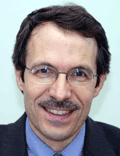November 2, 2010 — Josep Dalmau, MD, PhD, professor of neurology at the University of Pennsylvania, Philadelphia, was twice honored by the American Neurological Association at its recent annual meeting.
The pioneering neuro-oncologist was the recipient of The George W. Jacoby Award, which is given triennially to a member of the association who has done "especially meritorious experimental work upon any neurologic or psychiatric subject."
 |
| Dr. Josep Dalmau |
Dr. Dalmau was also honored with the 2010 Annals of Neurology Prize for the best paper published in the past year, for his article entitled, "AMPA Receptor Antibodies in Limbic Encephalitis Alter Synaptic Receptor Location" [Ann Neurol. 2009;65:424-434]. The Annals of Neurology is the official publication of the association.
"Dr. Dalmau's work on identifying antibodies to neuronal proteins that cause specific neurological disorders is groundbreaking," commented David Holtzman, MD, from the Washington University School of Medicine, in St. Louis, Missouri. "It has led to the identification of new mechanisms of disease, as well as treatments for some previously untreatable diseases," he told Medscape Medical News.
Novel Concept
It was the concept behind the article, more than the article per se, that was responsible for the award, Dr. Dalmau said in an interview.
"We demonstrated that there is a subgroup of patients with limbic encephalitis who have antibodies against the glutamate AMPA receptor, and that these antibodies modify the levels of this receptor," he explained to Medscape Medical News. "The antibodies displace these receptors, so they are no longer on the cell surface, where they do their job, but are internalized or pushed away from the synapses to extrasynaptic sites. This was a concept that has never been so clearly demonstrated before."
Dr. Dalmau was born and raised in Barcelona, Spain. He received his MD and PhD degrees from the Autonoma University of Barcelona, where he completed an internship in internal medicine and a residency in neurology.
Early on, while still in medical school, Dr. Dalmau found that he was interested in 2 specialties — neurology and oncology. When he finished his training, however, he had to pick one or the other to continue in Spain. He chose neurology.
He trained at Barcelona's Hospital de Sant Pau, the original buildings of which date back to medieval times. "It is a very beautiful hospital because the newer buildings from 1902, designated as a Unesco World Heritage Site, were designed by a famous Catalan architect, Lluis Domenech i Montaner," he noted.
At the end of his neurology training, he found that his interest in oncology had been renewed.
Complementary Specialties
"During my neurology residency I saw many patients with cancer who developed neurological problems because their cancer went to the brain or to the spinal cord, or because the treatments they received had side effects, or because they had a stroke. I realized that it would be fantastic to pursue becoming a specialist in both," he said. To do that, though, he would have to leave Spain.
Dr. Dalmau decided to approach Jerome B. Posner, MD, attending neurologist at Memorial Sloan Kettering Cancer Center in New York City.
"Dr. Posner is considered the leading figure in neuro-oncology, a specialty that deals with tumors of the nervous system and all of the associated complications of cancer in the nervous system," Dr. Dalmau said. "He very generously offered me a fellowship, and so I went, with a grant from Spain. My idea was to go there for 1 year, but I spent 10 years in New York."
It was at Memorial Sloan Kettering that Dr. Dalmau's interest in autoimmunity was sparked.
"There are patients who have cancer, and others who have benign tumors, and they develop immune responses that attack the brain. These are called paraneoplastic syndromes. Dr. Posner is a leader in this field. I became involved in this type of research, and this has led me to study patients who have similar syndromes but who may or may not have cancer," Dr. Dalmau said. "In some way, this completes the circle and leads to the studies we are doing now."
Modest Beginnings
Dr. Dalmau is the first in his family to become a physician. His origins are modest, he said.
"My family is a very humble family. My father was a child during the Civil War. He is from a generation that didn't have a lot of opportunity to get a good academic education," he said. "As a result, this generation is very accomplished in practical ways. They had to provide for their families, and they knew how to do everything, except electronics, which they did not have at that time. They had to develop survival skills. If you get lost on a desert island, you want to get lost with people of that generation, not with me. You would not survive 1 day."
In addition to finding his true calling in New York, Dr. Dalmau also met his wife.
Myrna R. Rosenfeld, MD, PhD, is also a neuro-oncologist with the same interest in paraneoplastic disorders as her husband and has coauthored several studies with him. The 2 met as fellows in Dr. Posner's lab.
"She's a New Yorker, from Brooklyn. I was fortunate to meet someone in the same field. It has worked very well for us," he said. "Some people say they don't know how we can do it because we work in the same place and we have offices that are close together. But it has worked well."
After Sloan Kettering, the couple moved to the University of Arkansas in Little Rock, where they stayed for 3 years, before moving to the University of Pennsylvania.
"It was a very good experience. The University of Arkansas has a very interesting cancer center and is very well known because of the work done there on myeloma. Since my wife is also a neuro-oncologist it is difficult to find a place for 2 people, so we went there and it was one of the happiest times. I remember the time there very nicely," Dr. Dalmau said.
Independent Investigator
It was his first step away from his mentor's lab to become an independent investigator in his own right, he added.
"My main mentor was no longer with me," he said. "I was moving away to become a completely independent investigator. I had to get my own grants, and so on, so it was an interesting time for me. If your mentor is such a big figure in the field, there comes a time when you have to establish yourself. So that is what I tried to accomplish in Arkansas."
"Josep has advanced the field far, far further than I was ever able to," Dr. Posner told Medscape Medical News. "He's terrific. And he met his wife in our laboratory. Myrna was also a fellow, and they did some work together, and they eventually got married, which is terrific. He has been a seminal figure in paraneoplastic syndromes and really has done incredible work in the field. He has advanced it in a major way that had not been done before."
Dr. Dalmau says his work can be defined as truly translational.
"I'm a clinician, and I see these cases that are puzzling for everyone. Patients come and we don't have answers, so we try to find the cause and mechanism of their disease in the lab, and then we move back to the clinic with our answers," he says. "So I am on the front lines treating patients, and then I can also go and see if I can discover a better way of diagnosing and treating their disease faster and better. It is very satisfying work."
Medscape Medical News © 2010
Cite this: Dr. Josep Dalmau Twice Honored by the American Neurological Association - Medscape - Nov 02, 2010.











Comments